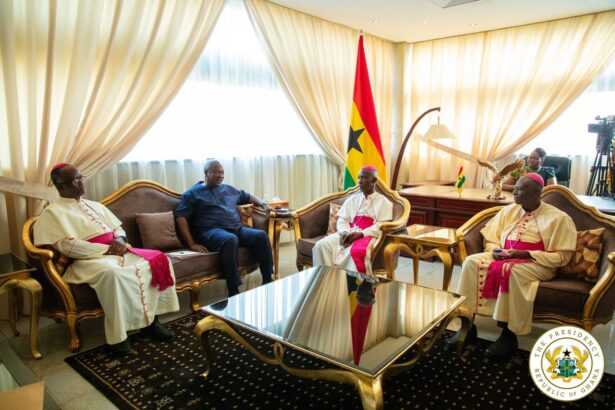The Ghana Catholic Bishops Conference has intensified its advocacy for the swift reintroduction and passage of the anti-LGBTQ+ bill, formally known as the Promotion of Proper Human Sexual Rights and Ghanaian Family Values Bill. This renewed push comes after a meeting with President John Dramani Mahama, who suggested a government-sponsored bill would facilitate broader national dialogue and consensus-building compared to the existing Private Member’s bill. While acknowledging the President’s proposal, the Bishops underscored the urgency of enacting the legislation, emphasizing the overwhelming public support for it and cautioning against any technical maneuvers that might undermine the will of the Ghanaian people.
The proposed bill, if passed, would criminalize LGBTQ+ identities and activities, imposing severe penalties on individuals who identify as LGBTQ+, engage in same-sex relationships, or advocate for LGBTQ+ rights. It also seeks to prohibit any form of support or advocacy for LGBTQ+ individuals and organizations. The Bishops’ fervent support for the bill stems from their interpretation of traditional Ghanaian values and religious doctrines, which they believe are contradicted by LGBTQ+ identities and practices. They argue that the legislation is necessary to protect the moral fabric of society and uphold what they consider to be the authentic Ghanaian family structure.
President Mahama’s suggestion of a government-sponsored bill, while seemingly supportive of the legislation’s objective, introduces a new dimension to the debate. By taking ownership of the bill, the government could potentially broaden the scope of consultations, incorporating input from diverse stakeholders, including human rights organizations, legal experts, and members of the LGBTQ+ community. This approach, while potentially delaying the passage of the bill, could lead to a more nuanced and comprehensive piece of legislation that balances competing interests and addresses concerns regarding human rights violations.
The debate surrounding the anti-LGBTQ+ bill exposes a deep societal divide on the issue of sexual orientation and gender identity in Ghana. Supporters of the bill argue that it reflects the cultural and religious values of the majority of Ghanaians, who view LGBTQ+ activities as immoral and contrary to their traditional beliefs. They maintain that the bill is necessary to safeguard societal norms and prevent the perceived “Westernization” of Ghanaian culture.
Opponents of the bill, including human rights organizations and international bodies, contend that it violates fundamental human rights, including the rights to freedom of expression, association, and privacy. They argue that criminalizing LGBTQ+ identities and activities will further marginalize an already vulnerable population, exposing them to discrimination, violence, and persecution. Furthermore, they argue that the bill will create a climate of fear and intolerance, undermining efforts to promote inclusivity and diversity in Ghanaian society.
The President’s emphasis on revising school curriculums to integrate moral and cultural teachings, reinforcing Ghanaian and African values, adds another layer of complexity to the debate. While the intent may be to instill a sense of national identity and cultural pride, concerns arise about the potential for such revisions to be used as a platform to disseminate homophobic and transphobic narratives. Critics argue that using the education system to promote specific ideologies, especially those that discriminate against minority groups, could have detrimental effects on the development of young people and their ability to embrace diversity and tolerance. The delicate balance between cultural preservation and the protection of human rights remains a central challenge in this ongoing discourse. The future of the anti-LGBTQ+ bill in Ghana, and its potential impact on the lives of LGBTQ+ individuals and the fabric of Ghanaian society, hangs in the balance, awaiting the outcome of further deliberations and political maneuvers.


